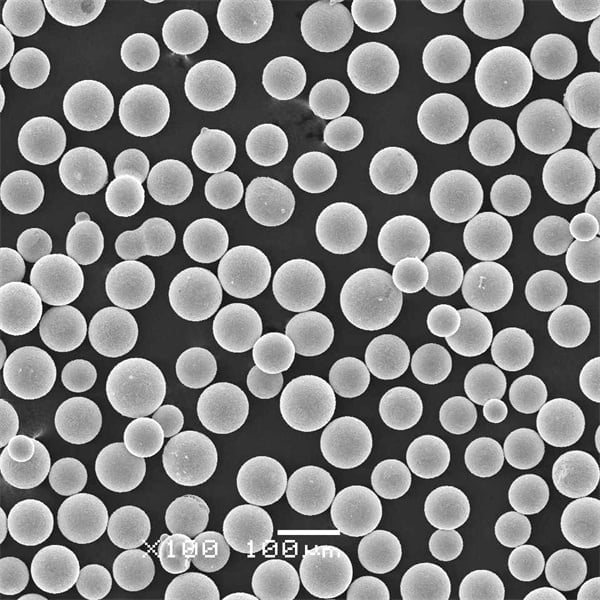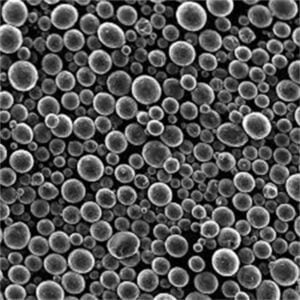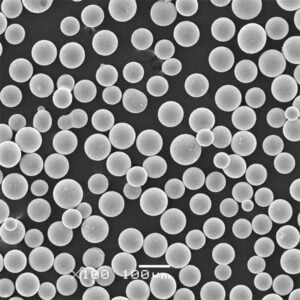Chromium CoCr Powder
Chromium CoCr powder, also known as cobalt-chromium powder, is a specialized metal powder used in various industrial applications such as metal 3D printing, surface coating, and the manufacturing of medical implants.
It is an alloy composed primarily of cobalt and chromium, with additional elements like molybdenum, nickel, iron, manganese, and silicon added in smaller quantities. The exact composition can be customized as per application requirements.
Chromium CoCr alloys are valued for properties like high strength, corrosion resistance, biocompatibility, and wear resistance. The powder metallurgy process allows components with complex geometries to be manufactured from this material.
Low MOQ
Provide low minimum order quantity to meet different needs.
OEM & ODM
Provide customized products and design services to meet unique customer needs.
Adequate Stock
Ensure fast order processing and provide reliable and efficient service.
Customer Satisfaction
Provide high quality products with customer satisfaction at the core.
share this product
Table of Contents
Overview
Chromium CoCr powder, also known as cobalt-chromium powder, is a specialized metal powder used in various industrial applications such as metal 3D printing, surface coating, and the manufacturing of medical implants.
It is an alloy composed primarily of cobalt and chromium, with additional elements like molybdenum, nickel, iron, manganese, and silicon added in smaller quantities. The exact composition can be customized as per application requirements.
Chromium CoCr alloys are valued for properties like high strength, corrosion resistance, biocompatibility, and wear resistance. The powder metallurgy process allows components with complex geometries to be manufactured from this material.
Composition
Typical Composition Range of Chromium CoCr Powder
| Element | Weight % |
|---|---|
| Cobalt (Co) | 40-65% |
| Chromium (Cr) | 19-30% |
| Molybdenum (Mo) | 0-10% |
| Nickel (Ni) | 0-1% |
| Iron (Fe) | 0-5% |
| Manganese (Mn) | 0-1% |
| Silicon (Si) | 0-1% |
| Carbon (C) | 0-0.75% |
| Other trace elements | 0-1% |
The ratio of cobalt to chromium can be adjusted based on whether wear resistance or corrosion resistance is more critical for the application. Higher chromium content improves corrosion and oxidation resistance. Higher cobalt provides better wear properties.
Custom alloys can also be produced with non-standard compositions tailored for specialized applications in industries like aerospace, energy, and electronics.
Production Process
Chromium CoCr powder is manufactured through a gas atomization process in which the liquefied alloy is hit by high-pressure jets of inert gas like argon or nitrogen. This breaks the molten stream into very fine droplets that solidify into spherical powders.
The particle size distribution can range from 10 microns to over 100 microns based on requirements. Finer powders provide better sintering, while coarser particles improve powder flow characteristics.
Gas atomized CoCr powders have higher purity, more uniform composition, consistent particle sizes, and better flow compared to water atomized variants. However, they tend to be 15-20% more expensive due to higher production costs.
Properties
Physical and Mechanical Properties of Chromium CoCr Powder
| Property | Description |
|---|---|
| Particle morphology | Predominantly spherical with some satelliting |
| Apparent density | Around 4 g/cc |
| Tap density | Up to 5.2 g/cc |
| Flow rate | Fairly free flowing > 1.25 g/s |
| Specific heat capacity | Around 0.44 J/g-°C |
| Melting point | 1260-1450°C |
| Tensile strength | Up to 1310 MPa |
| Yield strength | Up to 1210 MPa |
| Elongation | 8-16% |
| Hardness | Up to 50 HRC |
CoCr alloys deliver an excellent combination of high strength and hardness coupled with reasonable ductility. The properties can be customized by tweaking the relative composition of elements.
Characteristics
Special Characteristics of Chromium CoCr Alloy Powder
- Outstanding corrosion and wear resistance – Protective chromium oxide layer resists chemical attacks. High hardness retains dimensional integrity.
- Excellent biocompatibility and bio-inertness – Does not produce adverse reactions when used in medical implants.
- Retains strength and performance at high temperatures – Service temperature rating exceeds 800°C.
- Can be easily sterilized using normal hospital procedures.
- Lower density compared to alternatives like stainless steel – Lightweight constructs possible.
- Properties like hardness, corrosion resistance, etc. can be selectively enhanced.
- Powder production method allows very fine control over composition and size distribution.
These characteristics of chromium CoCr make it suitable for niche applications where regular alloys might struggle in terms of performance or safety.
Applications
Typical Applications of Chromium CoCr Powder
| Industry | Application Areas |
|---|---|
| Aerospace | Turbine engine components, landing gear parts |
| Automotive | Valve seats and guides, turbocharger parts |
| Energy | Coal gasification, nuclear and solar components |
| Industrial | Thermal spray coatings, tooling jigs and fixtures |
| Medical | Dental implants, orthopedic implants, prosthetics |
| Oil and Gas | Ball valve balls and seats, downhole tools |
Other niche applications include electrical contacts, welding rods, jewelry, magnets, coins, ammunition, fasteners, cutting tools, etc.
The biocompatibility and corrosion resistance is leveraged for manufacturing critical aircraft components as well as load-bearing medical implants like hip and knee joints.
Additive manufacturing provides greater design freedom to use CoCr constructs even in complex geometries needed for patient-specific implants.
3D Printing with Chromium CoCr Powder
Advantages of Metal 3D Printing Using Chromium CoCr Feedstock
- Wide range of achievable mechanical properties – As high as cast or forged equivalents
- Fabrication of patient-specific implants suited to anatomy
- Products with complex interior features like lattice structures
- Limited part quantities with no requirement for tooling
- Reduced waste generation owing to additive nature
- Conformal cooling channels can be incorporated into parts
- Allows lightweight, optimized designs not feasible otherwise
- Shorter time to market for custom products
Both laser powder bed fusion (L-PBF) and binder jetting can process Chromium CoCr powder. L-PBF offers better properties while binder jetting enables larger construcs.
Specifications
Typical Size Distribution and Grades of Gas Atomized Chromium CoCr Powder
| Particle Size (microns) | Size Distribution | Common Grades |
|---|---|---|
| <20 | Used for binder jetting | CCo-20, CoCr-20s |
| 20-45 | Suitable for most LPBF processes | CCo-28, CoCr-28M |
| 45-100 | Optimal flow properties | CCo-45, CoCr-45H |
| >100 | For thermal spray applications | CCo-106, CoCr-106 |
Finer powders provide higher resolution while coarser particles improve flow. Size can be optimized for parameters like layer thickness, surface finish, build speed, and post processing needs.
Relevant Standards for Composition and Manufacturing
- ASTM F75, ISO 5832-4, 5832-12: Alloy composition for cast cobalt-chromium surgical implants
- ASTM B348: Standard specification for titanium and titanium alloy powders
- ASTM F3055, F3056: Specifying characteristics of additive manufacturing metal powders
Suppliers and Pricing
Indicative Pricing Range of Gas Atomized Chromium CoCr Powder
| Condition | Price Range |
|---|---|
| Vacuum packed | $50 – $150 per kg |
| Inert gas sealed | $60 – $200 per kg |
Pricing depends strongly on order volume, particle size distribution, gas atomization method (air or argon), and quantity of trace elements.
Some Leading Suppliers
- Carpenter Additive
- Sandvik Osprey
- Praxair
- Hoganas
- LPW Technology
- Erasteel
Cobalt alloys face variable raw material supply and extreme price volatility. Long term supply contracts are advisable for volume buyers.
Comparison With Alternatives
How Chromium CoCr Compares to Tool Steel and Stainless Steel Powders
| Parameter | Chromium CoCr | Tool Steel | Stainless Steel |
|---|---|---|---|
| Density | Low | Medium | Higher |
| Hardness | High | Very high | Medium |
| Strength | High | Medium | Medium |
| Corrosion Resistance | Excellent | Poor | High |
| Wear Resistance | Excellent | Good | Medium |
| Bio-inertness | High | Unproven | Moderate |
| Raw material cost | High | Low | Medium |
| Thermal properties | Better | Poor | Moderate |
| Manufacturability | Complex | Moderate | Easy |
Tool steels have outstanding hardness and can be alternative wear-resistant substitutes if biocompatibility is unimportant. Stainless steels are cheaper and adequate for normal corrosion protection needs.
For critical applications demanding reliability, performance, and safety, Chromium CoCr outperforms regular iron and steel alloys on multiple counts. The higher price tag is justified for unique use cases.
FAQ
What is Chromium Cobalt (CoCr) powder? Chromium Cobalt (CoCr) powder is a metal alloy powder composed primarily of chromium and cobalt. It is known for its excellent corrosion resistance, high-temperature stability, and biocompatibility. What are the main properties of Chromium Cobalt (CoCr) powder? Chromium Cobalt (CoCr) powder exhibits high strength, hardness, corrosion resistance, and biocompatibility, making it suitable for various applications. What are the common applications of Chromium Cobalt (CoCr) powder? CoCr powder is commonly used in industries such as aerospace, medical, and dental. It is used in the production of aircraft engine components, orthopedic implants, dental prosthetics, and more. Is Chromium Cobalt (CoCr) powder safe for medical implants? Yes, CoCr is considered a biocompatible material and is widely used in the medical field for implants such as hip and knee replacements. What are the advantages of using Chromium Cobalt (CoCr) powder in aerospace applications? CoCr’s high-temperature stability and corrosion resistance make it ideal for aerospace applications, including the manufacturing of jet engine components and gas turbine parts. know more 3D printing processesGet Latest Price
About Met3DP
Product Category
HOT SALE
CONTACT US
Any questions? Send us message now! We’ll serve your request with a whole team after receiving your message.

Metal Powders for 3D Printing and Additive Manufacturing
COMPANY
PRODUCT
cONTACT INFO
- Qingdao City, Shandong, China
- [email protected]
- [email protected]
- +86 19116340731











